As you get older, you get more tired. It’s just the way life goes. But do not mistake that for laziness. The more responsibility you take on, the more energy you use. Without checking yourself, you could burn out.
Given that the average person spends a significant portion of their time at work, prolonged periods of stress are likely to stem from the workplace. However, these stress periods are caused by an emotional, physical, and mental state of exhaustion. That can stem from all walks of life. In this context, the stress-related consequences of exhaustion separate burnout from laziness. While feelings of lethargy and unwillingness to do things may be the consequence of mental health difficulties, it’s important to make the distinguishment between the two, Typically, laziness can be resolved with some relatively small actions. Burnout requires a lot more work.
Understanding your fatigue is more than just laziness
Picture this scenario for a minute. You’ve just gone through an exceptionally busy period. Work has been full on, you’ve provided emotional support for a loved one and you just haven’t had time for yourself. No resources are left to allocate to the little, rejuvenating joys of life – exercise, reading, playing. So, you think to yourself, I just need to rest. You take a weekend to do that – sleep in, breakfast in bed, you name it. Monday then rolls around. You’ve had plenty of rest, yet you wake up feeling exhausted as if nothing has changed. If anything, it’s gotten worse. Your base energy level isn’t what it was a few months ago and everything feels more difficult, as if there’s no oil inside your internal machinery.
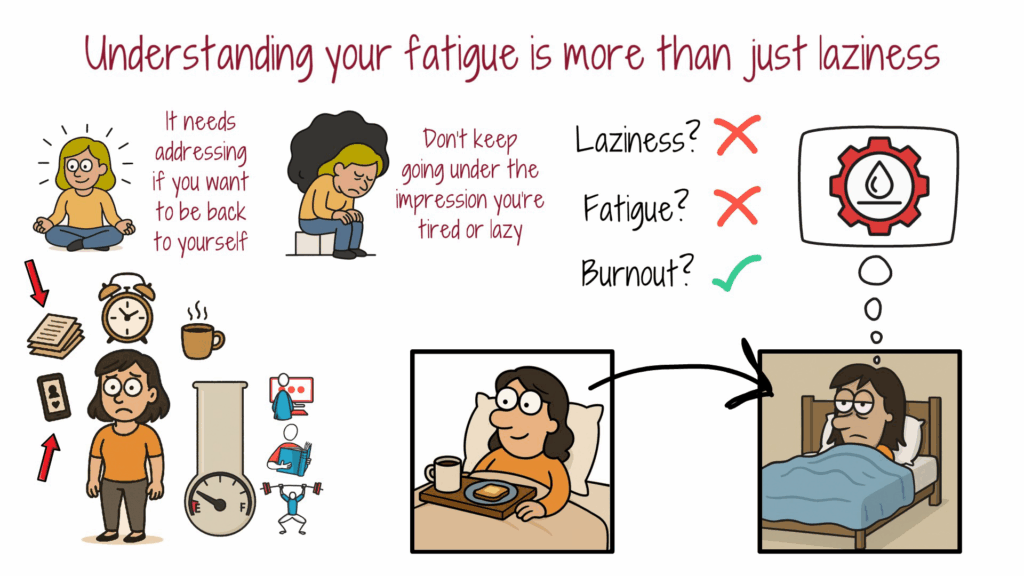
This is more than laziness. It’s more than fatigue. It’s burnout. Burnout is a feeling that stretches beyond tiredness – it’s consuming. Your body, mind, and general spirit are depleted.
It’s important to make that distinction because without recognising the weight of burnout, you may keep going under the impression you’re tired or lazy. You’re not. That’s okay, but it needs addressing if you want to be back to your normal, energetic self (or even just yourself).
What is burnout?
As I’ve already touched on, burnout is the emotional, physical, and mental state of exhaustion caused by excessive and prolonged stress. The word itself is useful – imagine a matchstick. The matchstick represents your physical, emotional, and mental energy. It can only burn for so long until there is nothing left.
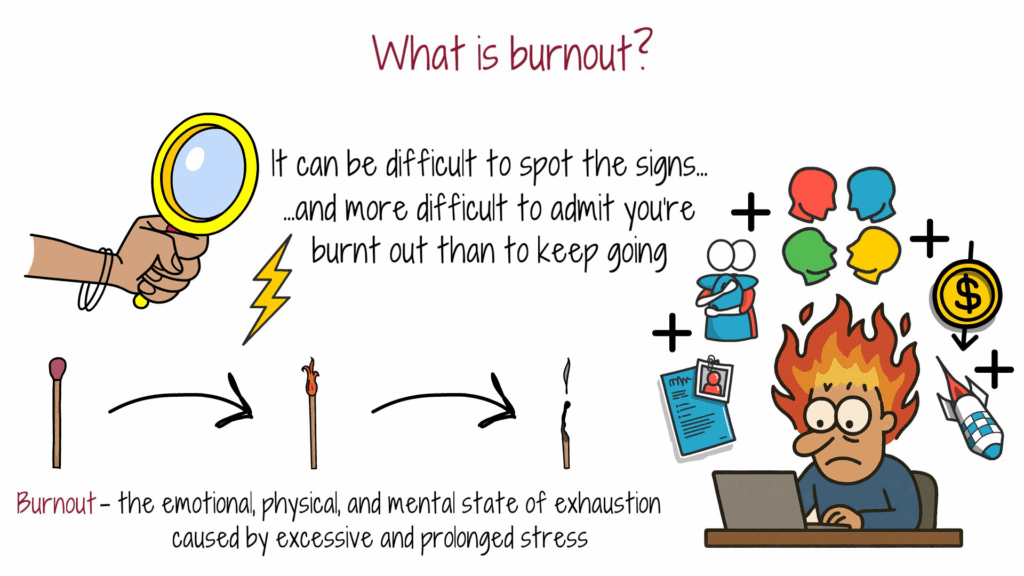
It can be difficult to notice the signs. Most people have so much going on at any given point, whether it’s work, relationships, family ties, or more socio-political issues like the cost of living crisis and escalating conflict worldwide. It can feel like you are constantly pivoting from one crisis that needs fixing to another. Even if it’s small, they all add up.
Having said that, it can be difficult to spot the signs, especially in yourself. If anything it is more difficult to admit you’re burnt out than to keep going. With that in mind, here are some example signs of burnout to look out for. The earlier you see them, the quicker you can tend to them. The quicker you notice, the less recovery time there will be.
Loss of passion
Burnout can lead to losing interest in previously enjoyed activities, differentiating it from laziness where that enjoyment may never have existed in the first place. You may think you’ll never grow to dislike something you love now, but it happens. For example, you may love lifting weights now. It’s a vice – something to take your feelings out on and grow stronger. But, the more burnout creeps in, the more monotonous it can become. The passion dies. It burns out.
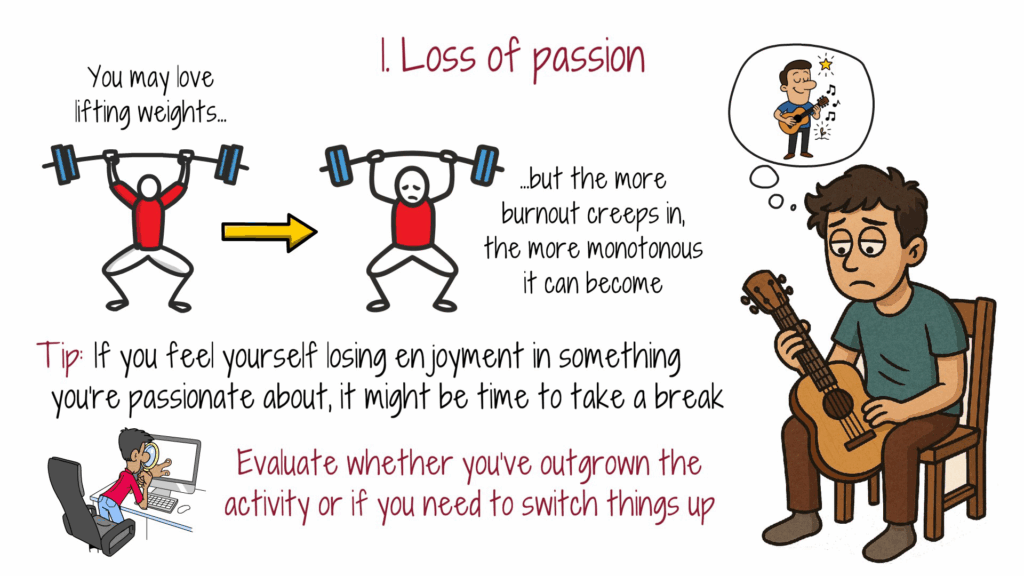
Tip: if you can feel yourself losing enjoyment in something you’re typically passionate about, it might be time to take a break. Use that break to evaluate whether you’ve outgrown the activity or if you need to switch things up for a bit. In the example just used, consider a different form of exercise such as swimming or running. Sometimes all it takes is a different approach.
Gradual changes
There is a progressive nature to burnout. It’s not a sudden slump or lack of energy. As previously discussed, it’s often the result of overworking, whether that’s at work or in all/other areas of your life. Each week that passes without you noticing is like a domino falling – one by one, they all come down. That’s why burnout can be difficult to notice.
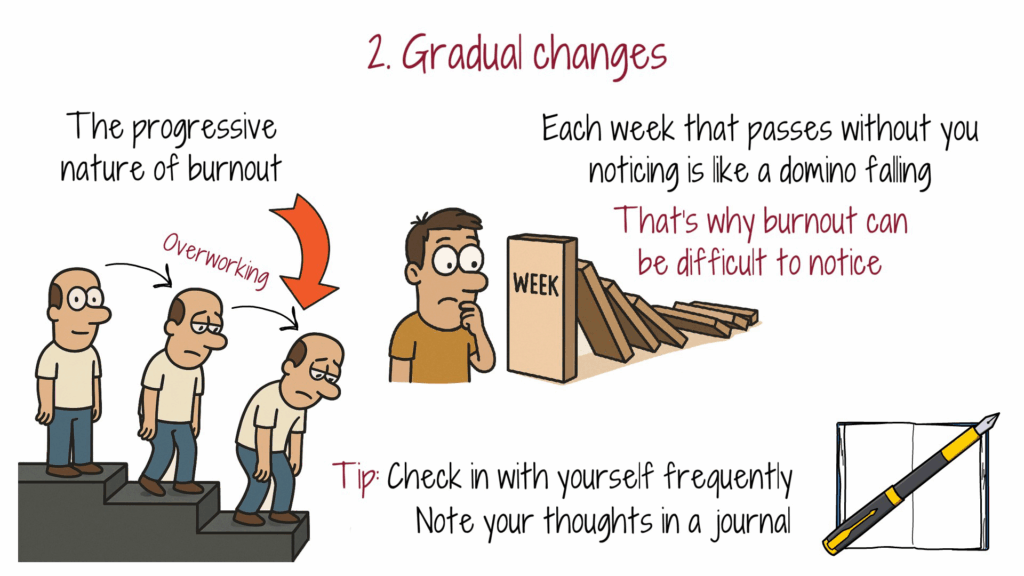
Tip: when it’s about yourself, it can be challenging to notice the signs. You’ve probably got a lot going on which makes it difficult to perceive yourself at all, let alone as someone who needs help. That’s why it’s a good idea to check in with yourself frequently. Take a minute to note your thoughts in a journal. Spilling your thoughts out is often the best, most immediate form of self-awareness you can get. And it’s free.
Neglecting self-care
A lack of personal care and social withdrawal are worrying signs of burnout. This could be changes in eating, sleeping, and personal grooming habits. For example, you may lose all energy to cook so you start eating ready meals and takeaways more frequently. Where you once stayed awake with friends in the evening, now you’re falling asleep.
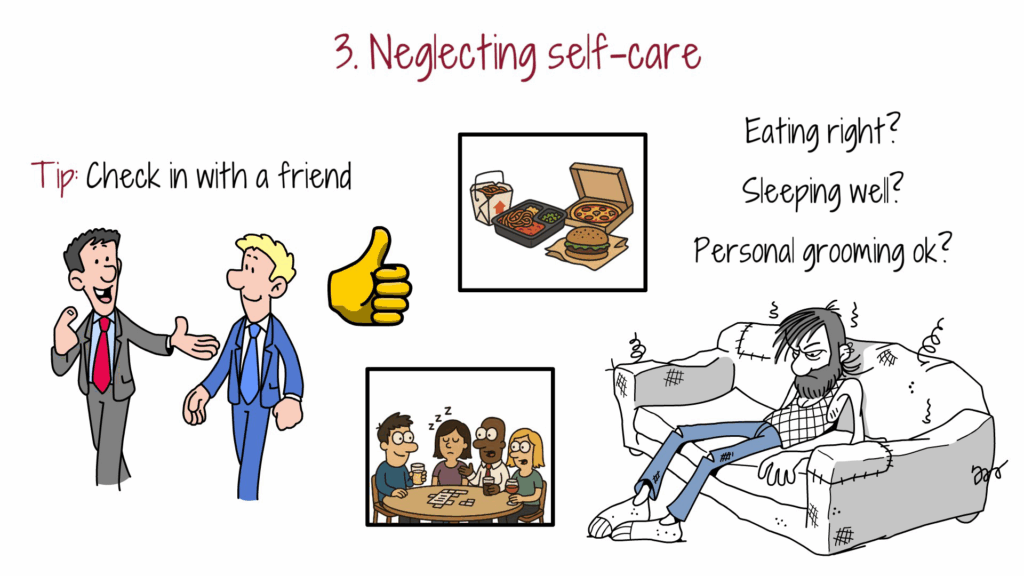
Tip: as this is one of the more visible signs of burnout, it’s a good idea to take a good look at yourself in the mirror every day – morning and night. Perhaps even better, check in with a friend. It can be difficult to point out deficiencies in our own lives – sometimes we need someone we trust to tell it exactly how it is.
Mood changes
Increased irritability and mood swings are symptoms of burnout. Of course, when you feel excessively tired, feelings of irritability can creep in as well. However, if rest doesn’t solve your mood changes, then perhaps you’re on the way to burnout. Conversely, a lazy person typically operates with a calm demeanour because emotions are simply too much effort sometimes. Burnout demonstrates an often dramatic change.
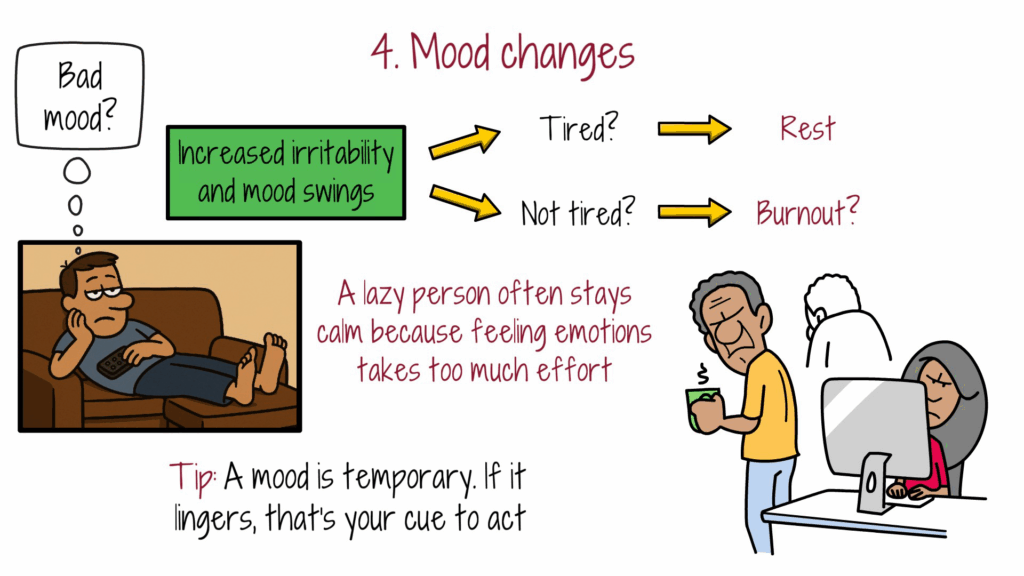
Tip: sometimes it’s easy to write off how you feel as “being in a bad mood.” But a mood is temporary. When it prolongs, you’ll know it’s time to act.
Emotional detachment
Depersonalisation is a symptom of burnout, where individuals feel disconnected from themselves and their surroundings, experiencing life as if on autopilot. This can feel particularly saddening. When the joy you feel at your favourite beat dropping or the warm onrushing scent of your favourite dinner becomes bland, you’re likely experiencing emotional detachment. In life, enjoying the little things adds up. It makes the whole experience worthwhile. You absolutely should be attached to things that bring you joy, so it’s important to take note when you don’t.
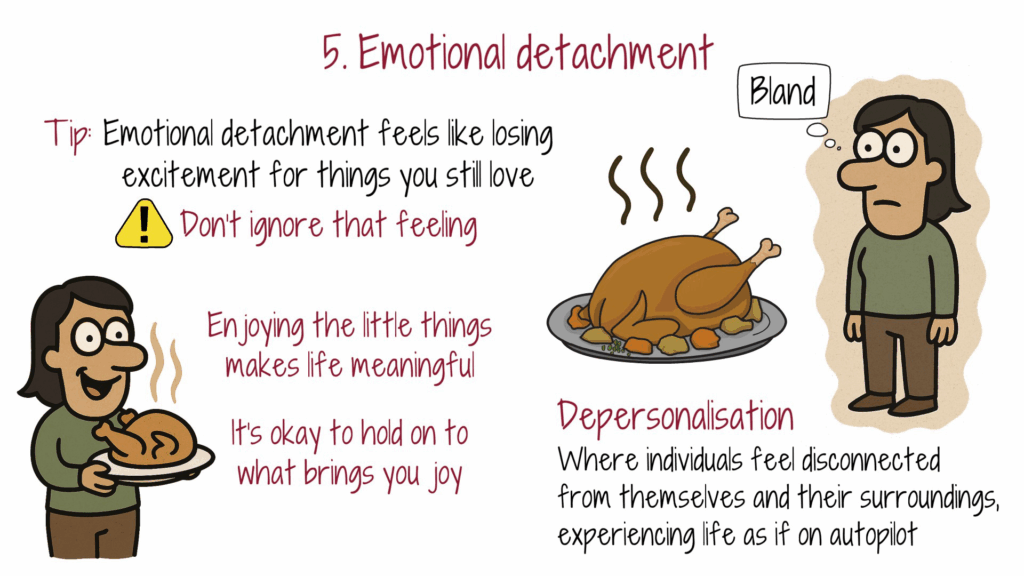
Tip: you can tell when you’re emotionally detaching because that feeling of excitement in your stomach (you know the one) doesn’t fizz over the things it used to fizz over. This isn’t just outgrowing your current life, either. These are things you know you love. It’s important not to brush them to the side.
Loss of motivation
Finally, a sudden lack of motivation, especially if you were previously self-driven, is a strong indicator of burnout rather than inherent laziness. Motivation is often difficult to come by, but when it’s consistently not there, finding it again can prove challenging. A loss of motivation may blur the line with laziness, but when it’s significant and consistent, it often indicates burnout.
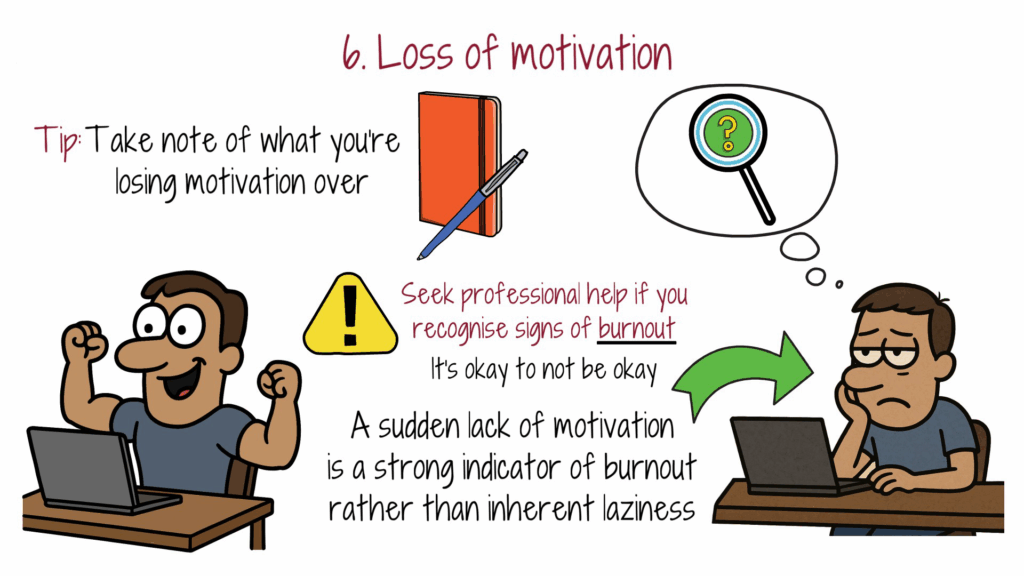
Tip: take note of what you’re losing motivation over. If it’s something you ‘want’ to do but haven’t started, don’t worry. If it’s the force of all of your drive, then take note. Burnout is serious, laziness is not.
Before we finish, it’s important you seek professional help if you recognise signs of burnout in yourself or others. Laziness can be brushed off, but burnout cannot. That is why it is so important you make the distinction between the two.
Remember, it’s okay to not be okay.
